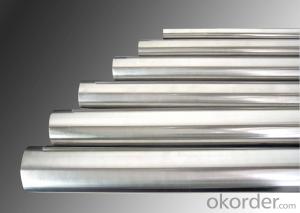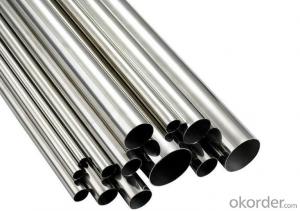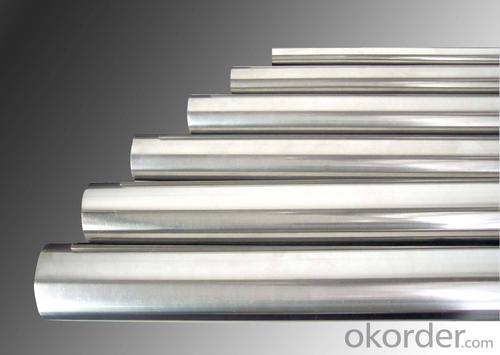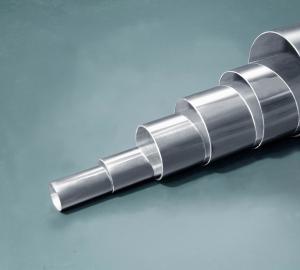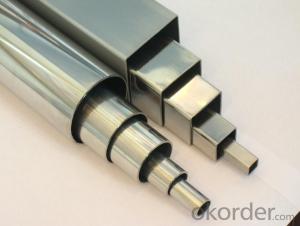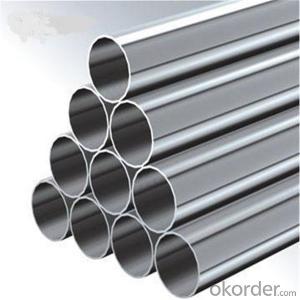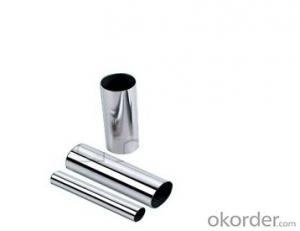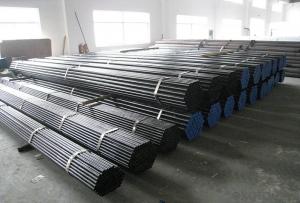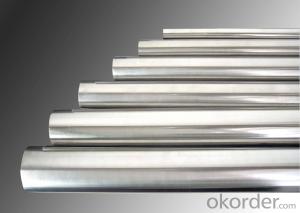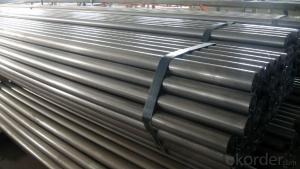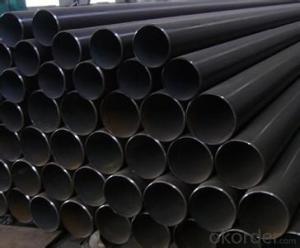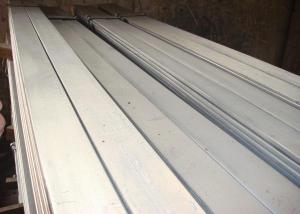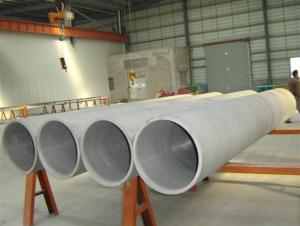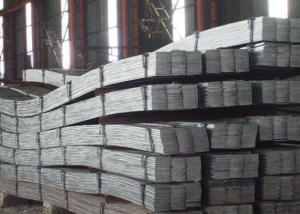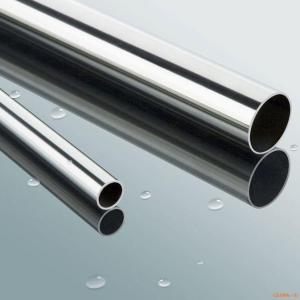Cold Drawn API Thin Wall Stainless Steel Pipe
- Loading Port:
- Tianjin
- Payment Terms:
- TT OR LC
- Min Order Qty:
- 35 m.t.
- Supply Capability:
- 5000 m.t./month
OKorder Service Pledge
OKorder Financial Service
You Might Also Like
Specification
Cold Drawn API Thin Wall Stainless Steel Pipe
1.Structure of Stainless Steel Pipe:
Seamless pipe is formed by drawing a solid billet over a piercing rod to create the hollow shell. As the manufacturing process does not include any welding, seamless pipes are perceived to be stronger and more reliable. Historically seamless pipe was regarded as withstanding pressure better than other types, and was often more easily available than welded pipe.
2.Main Features of the Stainless Steel Pipe:
• High manufacturing accuracy
• High strength
• Small inertia resistance
• Strong heat dissipation ability
• Good visual effect
• Reasonable price
3.Stainless Steel PipeSpecification:
Standard | GB, DIN, ASTM ASTM A106-2006, ASTM A53-2007 |
Grade | 10#-45#, 16Mn 10#, 20#, 45#, 16Mn |
Thickness | 8 - 33 mm |
Section Shape | Round |
Outer Diameter | 133 - 219 mm |
Place of Origin | Shandong, China (Mainland) |
Secondary Or Not | Non-secondary |
Application | Hydraulic Pipe |
Technique | Cold Drawn |
Certification | API |
Surface Treatment | factory state or painted black |
Special Pipe | API Pipe |
Alloy Or Not | Non-alloy |
Length | 5-12M |
Outer Diameter | 21.3-610mm |
Grade | 20#, 45#, Q345, API J55, API K55, API L80, API N80, API P110, A53B |
Standard | ASME, ASTM |
1) Material:20#(ASTM A 106/A53 GRB.API5LGRB,GB),45#,16Mn,10#.
2) Specification range:OD:21.3-610mm,WT:6-70mm,length:6-12m or according to the requirement of clients.
3) Excutive standards:GB,ASME API5L.ASTM A 106/A53,Despite of the above standards,we can also supply seamless steel pipe with standard of DIN,JIS,and so on,and also develop new products according to the requirements of our clients!
4) Surface:black lacquered,varnish coating or galvanized.
5) Ends:Beveled or square cut,plastic capped,painted.
6) Packing:bundles wrapped with strong steel strip,seaworthy packing.
4. Packing and Delivery:
Packaging Details: | seaworthy package,bundles wrapped with strong steel strip |
Delivery Detail: | 50-60days after received 30%TT or Original LC |
5. FAQ of Stainless Steel Pipe
A. How is the quality of your products?
Our products are manufactured strictly according to national and internaional standard, and we take a test on every pipe before delivered out. If you want see our quality certifications and all kinds of testing report, please just ask us for it.
Guaranteed: If products’ quality don’t accord to discription as we give or the promise before you place order, we promise 100% refund.
B. How about price?
Yes, we are factory and be able to give you lowest price below market one, and we have a policy that “ for saving time and absolutely honest business attitude, we quote as lowest as possible for any customer, and discount can be given according to quantity”,if you like bargain and factory price is not low enough as you think, just don’t waste your time.Please trust the quotation we would give you, it is professional one.
C. Why should you chose us?
Chose happens because of quality, then price, We can give you both.Additionally, we can also offer professional products inquiry, products knowledge train(for agents), smooth goods delivery, exellent customer solution proposals.Our service formula: good quality+good price+good service=customer’s trust
SGS test is available, customer inspection before shipping is welcome, third party inspection is no problem.
Any question, pls feel free to contact us !
6.Stainless Steel Pipe Images:
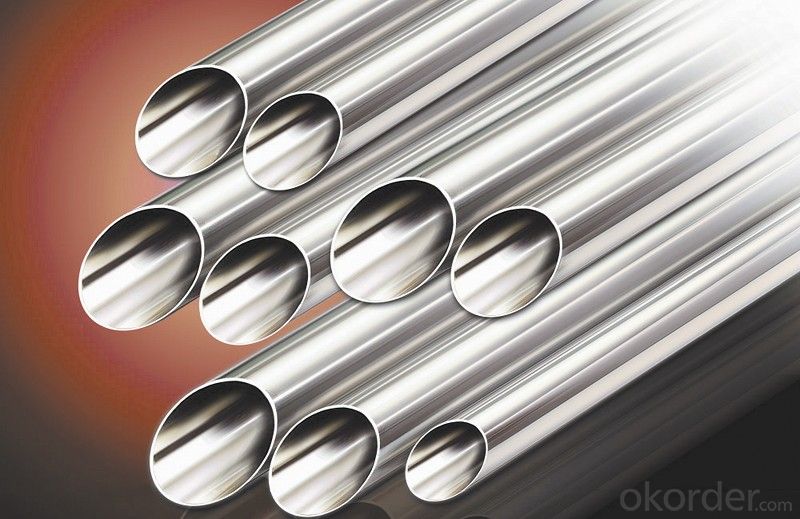
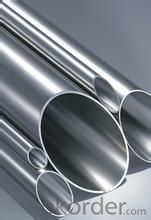
- Q: Can stainless steel pipes be used for underground drainage systems?
- Yes, stainless steel pipes can be used for underground drainage systems. Stainless steel is a durable and corrosion-resistant material that can withstand the harsh conditions often found underground, such as moisture, soil chemicals, and varying temperatures. It is also resistant to rust, which is a common problem in other types of pipes. Additionally, stainless steel pipes have a long lifespan and require minimal maintenance, making them a suitable choice for underground drainage systems.
- Q: How do you join stainless steel pipes together?
- When it comes to joining stainless steel pipes together, one has various methods to choose from based on their specific requirements and application. The most commonly used and widely preferred method is welding. This involves the application of heat to melt the material, resulting in a strong and durable bond. Different welding techniques, including TIG (Tungsten Inert Gas) or MIG (Metal Inert Gas) welding, can be employed for this purpose. Compression fittings are another popular choice, particularly in plumbing applications. These fittings consist of a compression nut and a ferrule that are tightened onto the pipe, ensuring a secure and leak-proof connection. In situations where a more robust connection is necessary, such as in high-pressure or high-temperature applications, flanges are utilized. This involves bolting flanges at the ends of two stainless steel pipes, creating a tight and reliable connection. Threaded connections are also an option, where one end of the pipe is threaded, and the other end is fitted with a threaded pipe fitting, such as a union or nipple. This method is often employed for smaller diameter pipes or situations that require frequent disassembly. For temporary or frequently disassembled connections, clamps and couplings are used. These devices clamp around the pipes and are tightened using bolts or other mechanisms, providing a secure connection. Considering the specific requirements, such as pressure, temperature, and corrosion resistance, is crucial when selecting the appropriate method to join stainless steel pipes. Seeking advice from professionals or consulting industry standards and guidelines can ensure a successful and reliable pipe connection.
- Q: Stainless steel why rust?
- Stainless steel surface adhesion contains acid, alkali and salt substances (such as decoration wall caustic soda, lime water splash), causing local corrosion.
- Q: Are stainless steel pipes suitable for high-temperature steam?
- Certainly, stainless steel pipes are well-suited for the transportation of high-temperature steam. Renowned for its exceptional resistance to both heat and corrosion, stainless steel proves to be an optimal choice for applications involving elevated temperatures and steam. The substantial presence of chromium and nickel in stainless steel aids in its ability to endure the corrosive impact of steam, thereby averting oxidation and preserving its structural integrity. Furthermore, stainless steel pipes boast remarkable strength and durability, guaranteeing their capacity to withstand the pressure and strain induced by high-temperature steam. In summary, stainless steel pipes provide a dependable and enduring solution for the conveyance of high-temperature steam across various industries, including power generation, chemical processing, and oil and gas.
- Q: Can stainless steel pipes be used in the construction industry?
- Yes, stainless steel pipes can be used in the construction industry. Stainless steel offers many advantages, making it a preferred choice for various construction applications. Firstly, stainless steel pipes have excellent corrosion resistance, which is essential in construction projects that involve exposure to moisture, chemicals, or extreme weather conditions. This resistance to corrosion ensures the longevity and durability of the pipes, reducing maintenance and replacement costs. Furthermore, stainless steel pipes have high strength and impact resistance, making them suitable for structural applications in buildings, bridges, and other construction projects. Their strength allows for the transportation of fluids and gases under high pressure, making them ideal for plumbing and HVAC systems. Stainless steel pipes are also highly hygienic and resistant to bacteria growth, making them suitable for applications in the food and beverage industry, hospitals, and laboratories. They are easy to clean and maintain, ensuring the safety and purity of the transported materials. Additionally, stainless steel pipes have aesthetic appeal, as they can be polished to a high shine or finished in various colors, making them suitable for architectural purposes. They can be used for handrails, staircases, exterior cladding, and other decorative elements in buildings. Overall, stainless steel pipes are versatile, durable, and corrosion-resistant, making them an excellent choice for the construction industry.
- Q: Are stainless steel pipes suitable for underground water supply?
- Indeed, stainless steel pipes are a fitting choice for underground water supply. With its exceptional resistance to corrosion and rust, stainless steel proves to be an optimal material for underground usage, where pipes may confront moisture, soil, and other corrosive substances. Notably, stainless steel pipes exhibit durability, longevity, and possess a remarkable tensile strength, enabling them to endure the pressure and strain of underground installations. Furthermore, stainless steel pipes maintain hygiene and do not release detrimental chemicals or pollutants into the water supply. All in all, stainless steel pipes present a dependable and secure alternative for underground water supply systems.
- Q: Can stainless steel pipes be used for chemical processing plants?
- Yes, stainless steel pipes can be used for chemical processing plants. Stainless steel is a popular choice for various industrial applications, including chemical processing, due to its excellent corrosion resistance properties. Chemical processing plants deal with various corrosive substances, such as acids, alkalis, and solvents, which can cause damage to ordinary steel pipes. However, stainless steel pipes are highly resistant to corrosion, making them suitable for handling aggressive chemicals and ensuring the safety and reliability of the plant. Additionally, stainless steel pipes can withstand high temperatures, pressure, and mechanical stresses, making them a durable and long-lasting choice for chemical processing plants.
- Q: What is the difference between 17-4 and 316 stainless steel pipes?
- The main difference between 17-4 and 316 stainless steel pipes lies in their composition and properties. 17-4 stainless steel, also known as SAE type 630, is a precipitation-hardening stainless steel that contains approximately 17% chromium and 4% nickel. It also contains small amounts of copper, niobium, and tantalum. The addition of these elements enables 17-4 stainless steel to undergo a heat treatment process, known as precipitation hardening, which increases its strength and hardness. This makes it suitable for applications that require high strength and good corrosion resistance, such as in aerospace and defense industries. However, it may not have the best resistance to certain corrosive environments compared to other stainless steels. On the other hand, 316 stainless steel is an austenitic stainless steel that contains approximately 16-18% chromium, 10-14% nickel, and 2-3% molybdenum. This composition provides excellent corrosion resistance, particularly in chloride-containing environments such as marine environments or coastal areas. 316 stainless steel is also known for its good weldability and formability, making it a popular choice in various industries including food processing, pharmaceuticals, and chemical processing. In summary, the primary difference between 17-4 and 316 stainless steel pipes lies in their composition and properties. 17-4 stainless steel offers higher strength and hardness through precipitation hardening, while 316 stainless steel provides superior corrosion resistance, especially in chloride-containing environments. The choice between the two will depend on the specific requirements of the application, with considerations for strength, corrosion resistance, and other factors.
- Q: What is the difference between 304J7 and 316J7 stainless steel pipes?
- The main difference between 304J7 and 316J7 stainless steel pipes lies in their composition and properties. 304J7 stainless steel is part of the 304 series, which is a widely used stainless steel grade known for its excellent corrosion resistance and durability. It contains around 18-20% chromium and 8-10% nickel, which contribute to its corrosion resistance and make it suitable for various applications, including plumbing, food processing, and chemical industries. On the other hand, 316J7 stainless steel belongs to the 316 series, which is a higher grade of stainless steel compared to 304. It contains a higher amount of chromium (16-18%) and nickel (10-14%) as well as the addition of molybdenum (2-3%), which further enhances its corrosion resistance, especially against chlorides and other aggressive environments. This makes 316J7 stainless steel pipes ideal for applications such as marine environments, coastal areas, and chemical processing plants. In terms of mechanical properties, 316J7 stainless steel pipes generally have higher tensile strength and creep resistance compared to 304J7. This makes them more suitable for high-pressure and high-temperature applications. Furthermore, 316J7 stainless steel pipes are often considered more expensive than 304J7 due to their superior corrosion resistance and enhanced properties. However, the specific pricing may vary depending on market conditions and other factors. In summary, while both 304J7 and 316J7 stainless steel pipes offer good corrosion resistance, 316J7 is a higher grade with superior resistance to chlorides and aggressive environments. The choice between the two will depend on the specific application requirements, budget, and environmental factors.
- Q: What is the difference between seamless and longitudinal welded stainless steel pipes?
- The manufacturing processes and structural characteristics of seamless and longitudinal welded stainless steel pipes vary. Seamless pipes, for instance, are formed by heating a solid cylindrical bar of stainless steel and pushing it through a die to create a hollow tube. This process eliminates the need for welded seams, resulting in a uniform composition and consistent strength and corrosion resistance. As a result, seamless pipes are commonly used in high-pressure applications like oil and gas pipelines and refinery equipment due to their superior mechanical properties. In contrast, longitudinal welded pipes are made by joining two separate pieces of stainless steel plate or sheet together through a longitudinal welding process. The plates or sheets are rolled into a cylindrical shape, and the seam is welded along the length of the pipe. This welding technique provides structural integrity and strength to the pipe, although it may introduce some slight inconsistencies in the steel's composition and properties. However, these inconsistencies can be minimized through appropriate welding techniques and quality control measures. Longitudinal welded pipes are widely used in various fields, including structural and architectural projects, as well as in industries such as food processing, pharmaceuticals, and petrochemicals. In conclusion, the main distinction between seamless and longitudinal welded stainless steel pipes lies in their manufacturing methods and resulting structural characteristics. Seamless pipes have no welded seams and offer excellent mechanical properties, making them suitable for high-pressure applications. On the other hand, longitudinal welded pipes are created by welding two separate stainless steel pieces together and are commonly utilized in different industries. The choice between these types of pipes depends on specific requirements and considerations for the intended application.
Send your message to us
Cold Drawn API Thin Wall Stainless Steel Pipe
- Loading Port:
- Tianjin
- Payment Terms:
- TT OR LC
- Min Order Qty:
- 35 m.t.
- Supply Capability:
- 5000 m.t./month
OKorder Service Pledge
OKorder Financial Service
Similar products
Hot products
Hot Searches
Related keywords
